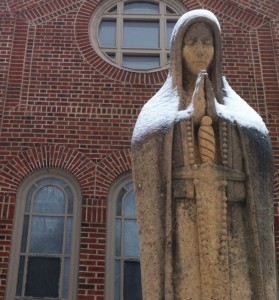Pope Benedict XVI will step down, making him the first pope to resign in 600 years.
Benedict’s resignation announcement Monday sets in motion a complex sequence of events to elect next leader of the Roman Catholic Church, starting when the Vatican summons a conclave of cardinals at least 15-20 days after the Pope steps down on Feb. 28.
When he became the 265th leader of the world’s Roman Catholics on April 19, 2005, Benedict, then 78, was the oldest pope elected in 275 years. He’s now 85, and in recent years he has slowed down significantly, started using a cane and travels to the altar in St. Peter’s Basilica on a moving platform to spare him the 100-yard walk down the aisle.
The Rev. Erich Rutten said that the Pope’s resignation doesn’t come as a surprise to him.

“He’s spoken on this issue many times. He’s a very practical and principled kind of guy. They’ve asked him, ‘Is it right for a pope to resign?’ and he’s been very consistent for a long time that a pope is allowed to resign,” Rutten said. “In fact, he’s talked about how he probably has a moral responsibility to do so if he can’t carry out the position.”
Papal resignations are extremely rare in the two-millennia history of the Catholic Church. The last pope to resign was Pope Gregory XII who stepped down in 1415 to help end a church schism.
Rutten said that having a former pope will be something new for the Catholic Church.
“What is kind of interesting is that as a church this is kind of unchartered territory,” Rutten said. “I mean we know how to go through a conclaid, that won’t be a big problem. But it’ll just a little bit funny to have a former pope; we’ve never had that for 600 years.”
Freshman Alex Brown said he didn’t know resignations were so uncommon.
“I had no idea it was the first time … in 600 years,” Brown said. “I’m shocked. I really don’t know what else to say. If he had health issues and he knew himself that it could affect his decisions, then I think he made the right decision to resign.”
Rutten stressed that being the pope is not like being the CEO of a company.
“It’s a relational role, pastoral role. However, he has made the determination that he can’t serve that as well as he could.”
Any baptized Roman Catholic male is eligible to be pope, but only cardinals have been chosen since 1378.
Sophomore Rachel Peterson said taking a potential pope’s age into consideration is important.
“It might not be a bad idea (to have a pope that’s younger) to keep up with the times and such,” Peterson said. “I’m not sure it really matters because he’s a pope. He’s probably … has pretty conservative views anyways.”
Freshman Macros Macias said he thinks the next pope should have good health and certain pope qualities.
“Caring, very community-based, helping, he has a sense of where he wants to take the Catholic Church community in the future,” Macias said.
Only cardinals under age 80 are eligible to vote on the next church leader, and those will be sequestered within Vatican City and take an oath of secrecy.
Two ballots are held in the morning and afternoon in the Sistine Chapel, and a two-thirds majority is required. The ballots are burned after each vote and smoke signals from the chimney signal the events inside.
Black smoke means there has been no decision that day; white means cardinals have chosen a pope and he has accepted. To avoid possible confusion over the color of smoke, bells also signal the election of a pope.
Pope Benedict XVI was a favorite going into the vote and was selected in the fastest conclave in a century: Just about 24 hours after the voting began, white smoke curled from the Sistine Chapel chimney at 5:50 p.m. to announce “Habemus Papam!” (Latin for “We have a pope!”)
Benedict tried to remind Europe of its Christian heritage and set the Catholic Church on a conservative, tradition-minded path that often alienated progressives.
Late last year, people who were spending time with the pontiff emerged saying they found him weak and too tired to engage with what they were saying.
A doctor familiar with the pope’s medical team told The Associated Press on Monday that the pontiff has no grave or life-threatening illnesses. But, the doctor said, the pope, like many men his age, has suffered some prostate problems. Beyond that, the pope is simply old and tired, the doctor said on condition of anonymity.
After his resignation, Pope Benedict XVI will return to being called by his birth name, Joseph Ratzinger.
Heidi Enninga, Ross Schreck, Anne Becken and Nicole Soyka contributed to this report.
